*This article was updated before the 2024-25 season
In the modern NHL, contract and salary cap management may be more critical than ever. The flat cap era is finally becoming a thing of the past, but teams cannot rush to spend money too quickly.
Every team in the league has a contract on the books that is questionable, no matter how good their GM is. This article will take a look at each team’s worst contract with two things in mind: first, contracts evolve. In most of these cases, the team would likely not sign the same deal knowing what they know now. So we will attempt to establish why these contracts were signed when they were signed.
Second, and in the same line, these deals tend to become albatrosses because of injury, reduced performance, or aging. So all of these opinions are written with due respect to the players who, for the most part, were once-great NHL players who earned these contracts at the time.
(The bolded text below each player name displays the term remaining on the contract, including the 2024-25 season, as well as the AAV and any no-trade clauses (NTC) or no-movement clauses (NMC) the deals contain.)
Anaheim Ducks: John Gibson
(Three years, $6.4 million, M-NTC)
For years, I have argued against including John Gibson on this list. In part, it was because he was once one of the top goaltenders in the league. In part, it was because the team he played for has been so poor. But in recent seasons, even as the Anaheim Ducks have started to slowly improve, Gibson has gotten worse. Last season was abysmal, as he posted a .888 save percentage (SV%) and a 3.54 goals-against average (GAA), with minus-21.2 goals saved above average (GSAA). Those numbers reflect one of the worst goaltenders in the NHL. And with three seasons at $6.4 million left on his contract, no team is going to be willing to take a chance that he could rebound with a change of scenery. It’s time to acknowledge that Gibson’s contract has become an albatross for the Ducks.
Boston Bruins: Charlie Coyle
(Two years, $5.25 million, M-NTC, NMC)
After the run that the Boston Bruins have been on, no one is complaining about bad contracts, but we have to pick one. Charlie Coyle’s contract is hardly one of the worst in the NHL, but on a team with very few notable bad contracts, his still stands out. The Massachusetts native was a huge contributor in the team’s run to the Stanley Cup the season he came over from the Minnesota Wild. Unfortunately, that recency bias influenced his contract early in the next season. Coyle is still a fine player and a solid contributor in Boston’s middle six. But a $5.25 million salary cap hit is a big commitment to a player who isn’t a clear difference-maker, and on a team with very strong contract management overall, it’s a deal that stands out.
Buffalo Sabres: Jordan Greenway
(One year, $3 million)
The Buffalo Sabres are a team without many long, bad contracts. But Jordan Greenway’s stands out. Buffalo took a shot on Greenway, acquiring him from the Minnesota Wild, hoping he could recover his top form in a new home. But it hasn’t really worked. He isn’t terrible, he just hasn’t been impressive. And on a team with very few bad contracts, that’s enough to earn the top spot for now.
Calgary Flames: Jonathan Huberdeau
(Seven years, $10.5 million, NMC)
” ” (from ‘NHL’s 10 worst contracts, 2024 edition: Jonathan Huberdeau, Darnell Nurse and more,’ The Athletic NHL, July 18, 2024). No one could have predicted Jonathan Huberdeau’s first two seasons with the Calgary Flames would go so badly. Certainly, then general manager Brad Treliving could not have when he inked Huberdeau to the richest contract in franchise history, an eight-year, $84-million monster deal. Treliving proffered the contract before Huberdeau had played a single game in Alberta — shortly after acquiring him in the shocking Matthew Tkachuk trade. Everyone knew it was a huge swing at the time, but Huberdeau was coming off a 115-point season, and the Flames were desperate to keep some quality players around for the long haul.
Jonathan Huberdeau has the worst contract in hockey. You know it. I know it. He knows it. He’s making franchise forward money for seven more seasons despite scoring like a second-liner in back-to-back seasons. There’s no use belaboring the point further — the question is whether he can do anything to get back on track.
Dom Luszczyszyn (From ‘NHL’s 10 worst contracts, 2024 edition: Jonathan Huberdeau, Darnell Nurse and more,” The Athletic NHL, July 18, 2024)
Unfortunately, Huberdeau suffered one of the most severe non-injury-related regressions in NHL history, seeing his point total more than halved, slashed down to 55. Only 15 of those points were goals. Huberdeau ranked fifth on the Flames in points, and the team missed the playoffs just one season after winning the Pacific Division. It was a disastrous outcome for both Huberdeau and the Flames, full stop. And his second season was even worse, dropping to 52 points and finishing at minus-29. The only hope now is that Huberdeau’s third season is a return to form for the Saint-Jerome, Quebec native.
Carolina Hurricanes: Jesperi Kotkaniemi
(Six years, $4.82 million)
The Carolina Hurricanes have developed a well-earned reputation for managing their salary cap well. But they might have made a mistake with Jesperi Kotkaniemi. The idea was simple enough: lock up a talented two-way forward long-term, keeping his salary cap hit low to buy the best seasons of his career. They locked him up on an eight-year, $38.5 million contract in 2022, after grabbing him via an offer sheet the offseason prior. Unfortunately, Kotkaniemi has not provided much offense, managing just 99 points in 227 games. Though he is responsible in his own end, $4.82 is still a lot to pay a defense-first forward. It’s not a nightmare contract, but if he can’t score more, the Hurricanes might live to regret this one.
Chicago Blackhawks: Seth Jones
(Six years, $9.5 million, NMC)
The Chicago Blackhawks’ decision to sell the farm and acquire Seth Jones when they did was a bit vexing. Their choice to immediately give him an eight-year, $76 million contract extension was outright befuddling. And now that they are in the middle of what can only be described as a scorched-earth rebuild, it is undeniable that Jones’ extension was a huge mistake.
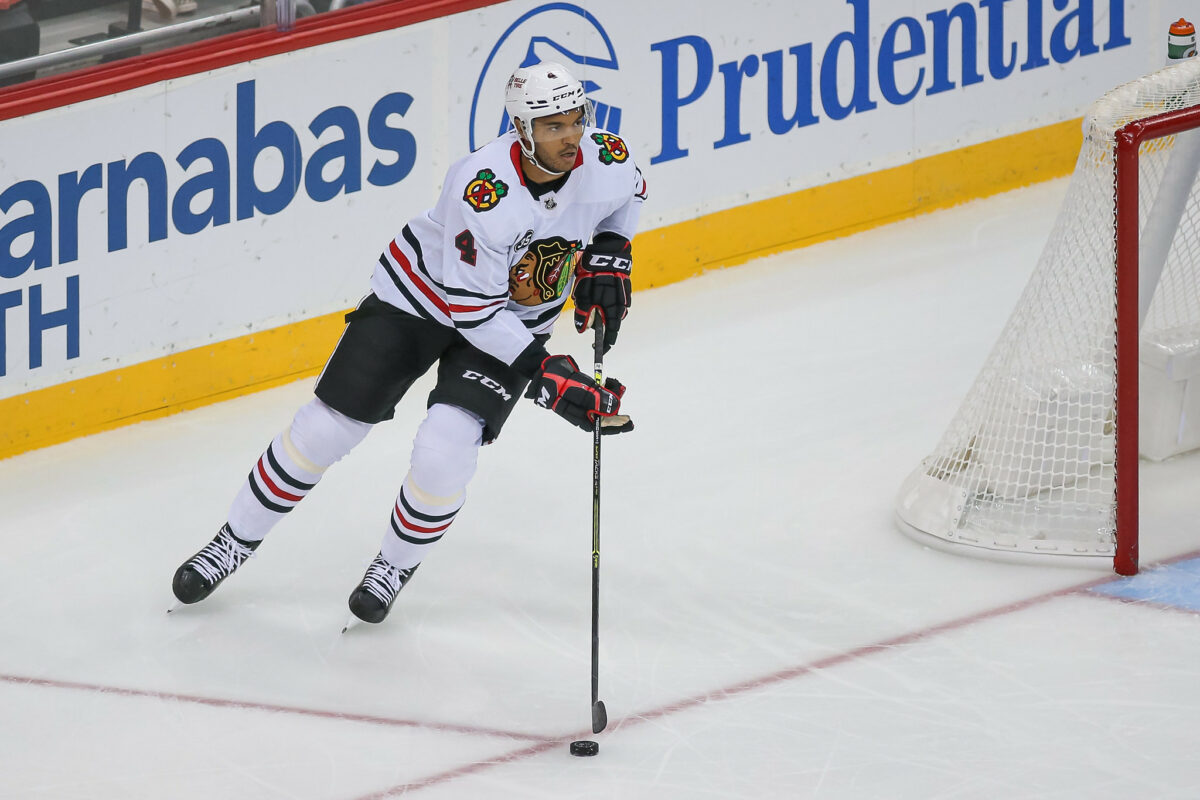
It’s not that Jones is truly a bad player. His metrics graded him as a plus defender last season if a bit lacking on the offensive side at even strength. But he is not worth that contract on any team, and certainly not on a team in the position the Blackhawks now find themselves in. Of course, the Blackhawks are now fully entrenched in the Connor Bedard era and likely don’t expect to compete for a few years while he matures. But Jones will still be around well into Bedard’s prime. And by then, this contract could look like a real blight on the team’s books.
Colorado Avalanche: Valeri Nichushkin
(Six years, $6.125 million, NMC)
Valeri Nichushkin earned the eight-year, $49 million contract he signed in July 2022. He was coming off a 25-goal season and was a major contributor to the Colorado Avalanche’s run to the Stanley Cup the previous season. He has been a great player with the Avalanche, and he still is when he’s on the ice. Unfortunately, he is on the ice less and less these days. Nichushkin entered Stage 3 of the NHL/NHL Players’ Association Player Assistance Program during the second round of the playoffs last season. He is required to miss a minimum of six months at this stage in the program.
Related: Avalanche’s Nichushkin Placed in Stage 3 of the Player Assistance Program
The reasons for any players’ admittance to the program are, appropriately, shrouded in mystery, and it’s inappropriate to speculate what might be going on. But Avalanche players at the time seemed disappointed in the circumstances. And, whether the distraction played a role or not, they would go on to lose that series to the Dallas Stars. Now, Nichushkin will miss most of the upcoming season. When he returns, he might still be a good player. But if the team cannot rely on him, his contract will remain an eyesore and a point of frustration for the Colorado front office over the next six years, unless they can find another solution.
Columbus Blue Jackets: Elvis Merzlikins
(Three years, $5.4 million, M-NTC)
The Columbus Blue Jackets have had the most tumultuous and heart-wrenching stretch for any NHL team in recent memory; perhaps in league history. It is hard to imagine any player performing well given everything members of this organization have had to go through over the past three seasons. But when looking for reasons for the team’s performance issues on the ice, it’s impossible to ignore the anemic output of goaltender Elvis Merzlikins.
Let’s be clear: virtually everyone is a fan of Merzlikins. His tearful eulogy at the funeral of beloved teammate Matiss Kivlenieks showed the kind of human being he is. But his play on the ice in recent seasons has been disastrous, and it’s not nearly good enough for the 11th-highest-paid goaltender in the league. He improved somewhat in the 2023-24 season but was still a net negative at minus-7.6 goals saved above average (GSAA). There is a lot of time and a lot of money left on his contract. Everyone will hope that he turns it around. The future of the Blue Jackets may depend on it.
Dallas Stars: Tyler Seguin
(Three years, $9.85 million, NMC)
It’s not often that a player is publicly called out by his team’s front office for poor performance, but Dallas Stars captain Jamie Benn and teammate Tyler Seguin have suffered that fate at least twice in their career. In 2018, CEO Jim Lites spoke to The Dallas News and said “what nobody says is what is completely obvious to me: We are getting terrible play from our top two players. If 14 (Benn) and 91 (Seguin) don’t lead we will not be successful.” Then, history repeated itself when owner Tom Gaglardi appeared on the Cam & Strick Podcast in 2022.
“When you sign contracts, you have to earn that,” Gaglardi told Andy Strickland. “The two guys are taking one-quarter of the cap space of the team, and both of them aren’t producing enough… I expect them to step up and get better.” In the following 2022-23 season, Benn answered the bell, returning to form as a star player with 33 goals and 78 points in his second-consecutive 82-game season. Seguin, for his part, has remained fairly mediocre, with 102 points in 144 games. It’s a decent stretch but was only good for 6th (2022-23) and 9th (2023-24) in points amongst Stars players. It’s simply not good enough for a player making so much money, especially for four more years.
Detroit Red Wings: Ben Chiarot
(Two years, $4.75, M-NTC)
Do you still believe in the Yzerplan? There are a few too many bad contracts on the books of the Detroit Red Wings already for a team that has yet to find any success under his leadership. And it’s difficult to choose the worst of the bunch. But Ben Chiarot takes the cake by a hair. His performance has been disastrous, and it’s only two years into his four-year deal. This is another one of those deals that most knew was a bad idea when it was signed. Chiarot was not a significant enough difference-maker for a rebuilding team to make him a big part of their defense. And now, they’re reaping the consequences of impulsive free-agent spending. If there IS a Yzerplan — the nickname given to the rebuilds orchestrated by general manager Steve Yzerman — it needs to materialize, and fast.
Edmonton Oilers: Darnell Nurse
(Six years, $9.25 million, NMC)
It’s hardly a surprise that Darnell Nurse’s extensive and expensive contract ended up ranked among the 10 worst in the league by The Athletic’s Dom Luszczyszyn (cited above). Nurse is a fine defenseman, but he’s being paid like a franchise defenseman, and he hasn’t been playing like one. To compound issues, he has been particularly bad in the postseason, becoming a regular target of criticism during last summer’s run to the Stanley Cup. Nurse is still an ok defenseman and is respected in the room. But you need more than that for a $9-plus million contract to not become an albatross, and his has.
Florida Panthers: Sergei Bobrovsky
(Two years, $10 million, NMC)
Well, this is a tough one to evaluate. One could argue Sergei Bobrovsky is a key reason the Florida Panthers won the Presidents’ Trophy in 2021-22, and the primary reason they reached the Stanley Cup Final the following season. He was electric, winning 12 of 19 games, more than any other goalie. And up until the Final, he seemed nearly unbeatable until he ran out of steam against the Vegas Golden Knights. He also had a fantastic 2023-24 season.
So why is Bobrovsky on this list? It’s simple: he’s still too expensive for his output. The NHL repeatedly proves that it is almost never a good idea to give an aging goalie a long contract. And the fact that Bobrovsky was ultimately outdueled by relative nobody Adin Hill in that Stanley Cup Final proves how fickle the position can be. Hopefully, Bobrovsky has two decent seasons left in him for the Panthers. But even if he does, it will be hard to argue his contract is worth it.
Los Angeles Kings: Drew Doughty
(3 years, $11 million, M-NTC)
Much like Nurse, Drew Doughty is still a very solid defenseman for the Los Angeles Kings. But his AAV ties him for the second-highest-paid defenseman in the league (tied with Rasmus Dahlin, and behind one defenseman who will appear further down this list), and he clearly isn’t performing at that level entering the season when he’ll turn 35.
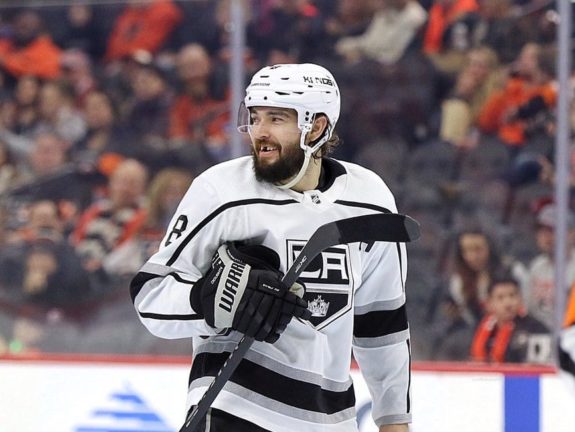
Doughty is a legend for the Kings. When he retires, he’ll become a Hockey Hall of Famer and he is already immortalized as part of the Kings’ monument outside Crypto.com Arena. But $11 million is simply too much for anything but a truly elite defenseman. And considering that absolute superstars like Cale Makar, Roman Josi, and Adam Fox have all signed for significantly lower AAVs since Doughty’s extension in 2018, it’s clear that his contract was an overpay from the start.
Minnesota Wild: Frédérick Gaudreau
(Four years, $2.1 million, M-NTC)
Let there be no mistake: in many ways, the worst contracts on the Minnesota Wild are still the twin contracts given to Zach Parise and Ryan Suter in July 2012. Though GM Bill Guerin finally took the plunge and bought both players out, those contracts will haunt the team for years to come, especially between 2022-2025, when they carry combined dead cap hits of roughly $12.6 million (2022-23) and $14.6 million (2023-24, 2024-25) that will effectively cripple the team in free agency, the trade market, and contract extension talks.
But, a bought-out contract isn’t officially in the spirit of this article, so for the worst active contract, we turn to Frédérick Gaudreau, who signed a five-year, $10.5 million contract in April 2023. It’s not that Gaudreau has been particularly bad for the Wild — he hasn’t. In fact, he reached a career-high 19-goal mark in 2022-23, shortly before signing the contract. The contract isn’t horrendous; it’s just a bit of a head-scratcher. A five-year commitment to a 30-year-old journeyman really feels out of place — similar to the deal the Avalanche gave to Wood. Guerin is probably trying to solve his cap dilemma by signing a longer-term contract to lower the cap hit; it’s just worth questioning whether Gaudreau was the right player for that commitment. Either way, the commitment was made, and Gaudreau will be a Wild player through the 2028-29 season.
Montreal Canadiens: Josh Anderson
(Three years, $5.5 million, M-NTC)
Unfortunately for them, the Montreal Canadiens have several contenders for this list. But they can bury the massive contract of Carey Price on LTIR for as long as they need to. Some would point to Nick Suzuki, but you still have to bet on his future if you’re a Canadiens fan — and the 2023-24 season was a good start down that path.
The same cannot be said for Josh Anderson, who is entering the fifth season of a seven-year, $38.5 million contract he signed with the Canadiens in 2020. Montreal signed him just days after acquiring him from the Blue Jackets, and they received criticism for giving such a long and expensive contract to a player with only one season of over 30 points in his career. After four seasons, the gamble clearly has not paid off. Anderson has continued to struggle to stay healthy and has managed only 108 points (with a minus-61 plus/minus) in his first three seasons with the team. Now undeniably in a rebuild, Anderson’s contract may still be on the books when Montreal is ready to compete again.
Nashville Predators: Steven Stamkos
(Four years, $8 million, NMC)
Yes, it will be controversial. But the new contract the Nashville Predators gave to Steven Stamkos this summer is not going to look good in two or three seasons. Of course, Stamkos is still one of the best goal-scorers in the league, probably in NHL history. But there’s a reason why the cap-conscious and ruthless Tampa Bay Lightning opted to let Stamkos, a franchise legend, walk and replace him with the younger (and more expensive) Jake Guentzel. It simply isn’t wise to make long investments in 34-year-old players, especially with Stamkos’s injury history. The Predators will be far better this season for having Stamkos. But they are only prolonging what will likely eventually be a deeply painful rebuild — made more painful, eventually, by this contract.
New Jersey Devils: Ondřej Palát
(Three Years, $6 million, NMC)
Back in 2022, the New Jersey Devils wanted to make another big splash in free agency after missing out on the postseason for the fourth season in a row, and they managed to grab Stanley Cup veteran Ondřej Palát on a five-year, $30 million contract.
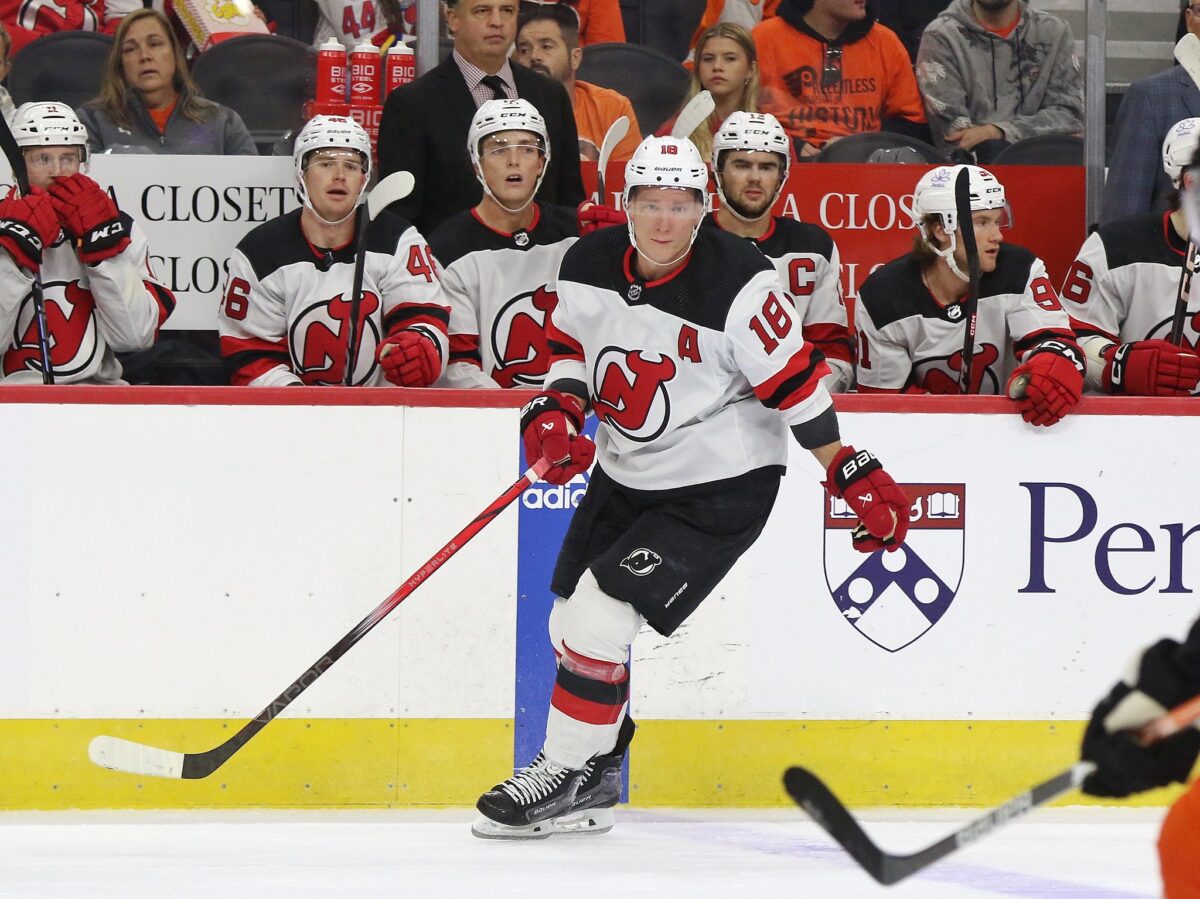
The good news is that the Devils returned to the playoffs, becoming one of the teams to watch of the season and finishing with 112 points, good for second in the Metropolitan Division. the bad news is that Palát was a non-factor, struggling with injuries and managing only 23 points in 49 games. Unfortunately, injuries plagued the 2023-24 Devils, and they once again missed the playoffs. Palát was a ghost, finishing ninth in points on a team riddled with injuries, despite playing most of a full season. He has not lived up to a $6 million cap hit in either of his first two seasons, and the Devils might wish to be rid of the three seasons left on the deal.
New York Islanders: Scott Mayfield
(Six years, $3.5 million, NTC)
A low AAV might make a contract more palatable, but it doesn’t make it good. And giving Scott Mayfield a seven-year extension in 2023 is one of the more perplexing moves in Lou Lamoriello’s career. Mayfield is fully entrenched behind Noah Dobson and Ryan Pulock as a RHD, meaning he’s being paid to be a third-pairing defenseman. He is already 31 and will turn 32 early in the 2024-25 season. He’s a fine stay-at-home defenseman, but a replaceable one, and giving him a seven-year extension is truly baffling. There are a few bad contracts on the Islanders, but his takes the cake.
New York Rangers: Jacob Trouba
(Two years, $8 million, M-NTC)
Despite winning the coveted Mark Messier Leadership Award, last season was a tough one for New York Rangers captain Jacob Trouba, and most fans were hoping to see the end of his tenure in the Big Apple this summer. Over the past three seasons, according to Evolving-Hockey, he ranks in the 11th percentile amongst defensemen, nowhere near good enough for his contract. He is also a lightning rod for controversy with a serious discipline history in the NHL. He might be a leader and he was once a popular player, but these days, Trouba is doing more harm than good for the Blueshirts.
Ottawa Senators: Josh Norris
(Six years, $7.95 million)
It’s very hard to pick a “bad” contract on the Ottawa Senators, but there is clearly a “most concerning” one, and that belongs to Josh Norris. The young center seems to have all the makings of a future star in the NHL, but he is struggling with a persistent shoulder injury that cost him almost all of the 2022-23 season, and a big chunk of the 2023-24 season as well. And it’s not the first injury concern of his career. The Senators signed Norris to an eight-year, $63.6 million contract because they think so highly of his future, but right now, his future is cloudy. If he’s fully healthy in 2024-25, someone else will undoubtedly occupy this spot. But for now, there are big red flags by Norris’s contract, and that’s as close as Ottawa gets to a “worst” contract, especially after trading Joonas Korpisalo this summer.
Philadelphia Flyers: Rasmus Ristolainen
(Three years, $5.1 million)
Rasmus Ristolainen is the archetype of a player that NHL general managers see with completely different eyes than the rest of us. Almost universally panned by statisticians and fans alike, GMs seem to take one look at his 6-foot-4 frame and his physical play style and get glossy-eyed. So even though it was a mistake before the ink was drying, it is no surprise that a team as badly run as the Philadelphia Flyers signed Ristolainen to a five-year, $25.5 million contract extension, which has three seasons remaining entering the 2024-25 season. Ristolainen’s isn’t the only questionable contract on the Flyers’ roster, and he had a decent season in 2023-24 as the team fought for and ultimately missed out on a playoff spot. But he just is not a good defenseman overall and is not worthy of such a costly contract.
Pittsburgh Penguins: Erik Karlsson
(Three years, $10 million, NMC)
How can the 2022-23 Norris Trophy winner and last offseason’s biggest trade acquisition be the worst contract on his team? Because despite the recent success, Karlsson has one of the worst contracts in the league. It might be controversial, and yes, he had 101 points in 2022-23. But he’s the highest-paid defenseman in the NHL, and he cannot play effective defense anymore.
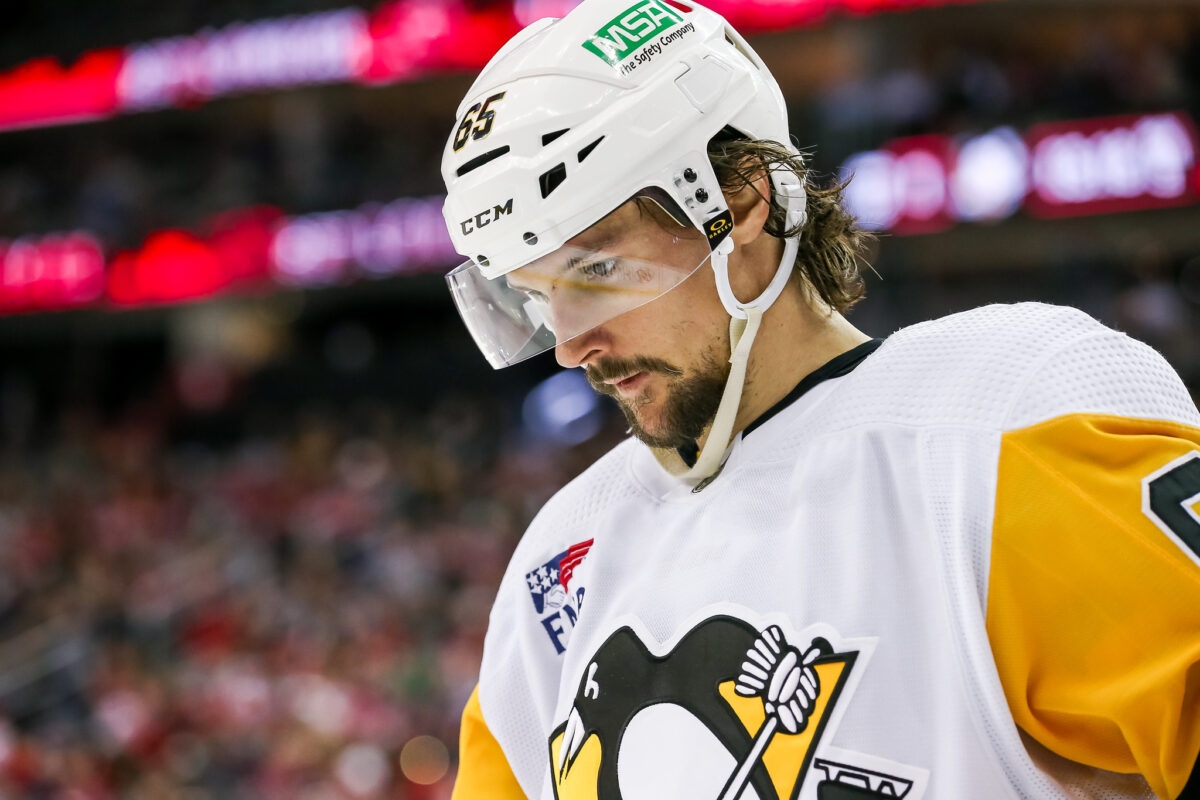
Karlsson has had a great career and just collected his third Norris Trophy. He’s a future inductee into the Hockey Hall of Fame without question. But he allowed the fourth-most expected goals against (xGA) and the fifth-most high-danger chances against (HDCA) at 5-on-5 even en route to a Norris Trophy season in 202-23. Despite scoring 101 points, he still managed to be a minus-26, an almost Herculean accomplishment of terrible defending. And the San Jose Sharks still finished 29th in the league despite his best efforts.
Newly installed general manager Kyle Dubas clearly saw something he liked in Karlsson. But in his first season in the Steel City, his offense was cut nearly in half, finishing with just 56 points. That is solid for a defenseman, but not worth $10 million. And if Karlsson isn’t providing paradigm-shifting offense, he certainly isn’t providing the defense to justify that contract.
San Jose Sharks: Marc-Edouard Vlasic
(Two years, $7 million, M-NTC)
For his part, young general manager Mike Grier did the nearly unthinkable in offloading Karlsson without sacrificing major future pieces. But he’s still got a ton of work to do if he wants to unbury the Sharks from the numerous bad contracts of his predecessors. Another of the worst offenders is Marc-Edouard Vlasic. Two years at $7 million is a lot better than the $11.5 million they owed to Karlsson when they traded him, but it’s still a lot for a non-impact player. Vlasic has been a fine and even very good defenseman in his career. But now, he’s well past his prime, and the Sharks have a lot of pain to go through before his contract expires. Still, for a team this deep in a rebuild, a Vlasic buyout might be unnecessary.
Seattle Kraken: Philipp Grubauer
(Three years, $5.9 million, NTC)
Don’t let the fact that the Seattle Kraken made the playoffs in just their second season in the NHL distract you from the fact that Philipp Grubauer has been a horrendously bad goaltender through three seasons with the team. When the Seattle Kraken signed the then Vezina Trophy finalist Grubuaer to a six-year, $35.4 million contract, it seemed like the coup of the offseason. Unfortunately, Grubauer has gone from being one of the best goaltenders in the league to being one of the worst. The Kraken have a fairly strong defense. But Grubauer has managed three straight seasons with a sub-.900 save percentage (SV%) and negative goals saved above-average (GSAA).
His 2023-24 campaign was a mild improvement on the seasons prior, but it still is not enough to justify his making $5.9 million. With a top goaltender, the Kraken would be a serious contender. But Grubauer will likely be the anchor that keeps this sea monster below the surface. Admittedly, Luszczyszyn ranked the new, massive Chandler Stephenson contract as one of the 10 worst in the league, and it does look bad. But at least he should be a plus player for the next few seasons, which cannot be argued for Grubauer.
St. Louis Blues: Colton Parayko
(Six Years, $6.5 million, NTC)
And now to another contract on Luszczyszyn’s list. When the St. Louis Blues signed Colton Parayko to an eight-year, $52-million contract extension after an injury-plagued season, they were gambling that they were buying a discount on maybe the most expensive position in the league. General manager Doug Armstrong saw the wild deals given to Zach Werenski and Jones and must have thought $6.5 million per season was a bargain for someone they thought would be the centerpiece of their defense.
Related: Blues’ Parayko Extension is a Big Gamble
Unfortunately, Parayko has not been the centerpiece. Or, if he is, he isn’t producing enough. The Blues’ identity has transformed. Once built on stout defense, they are now a high-octane offense whose blueline struggles to keep up at times. And Parayko is no longer the shutdown defenseman he once was. He also does not produce offense like the best top blueliners in the league, which makes him insufficient as a true #1 defender. Parayko isn’t a bad player, necessarily, and the 2023-24 season was one of his best in recent memory. But he still isn’t what the Blues need from him. Whether you agree that it’s one of the worst in the league or not; it is certainly one that any honest Blues fan would admit they wish had not been signed.
Tampa Bay Lightning: Nick Paul
(Five years, $3.15 million, NTC)
The Tampa Bay Lightning are ruthless with their salary cap — as evidenced by letting franchise legends like Stamkos walk away in free agency. And that makes it even more difficult to explain the seven-year contract given to Nick Paul after the 2021-22 season. Yes, the then-deadline acquisition played an important role for the Lightning in their deep run to the Stanley Cup Final. But the Lightning had seen rentals come and go before. Why was it so important to keep Paul that they would sign him for seven seasons?
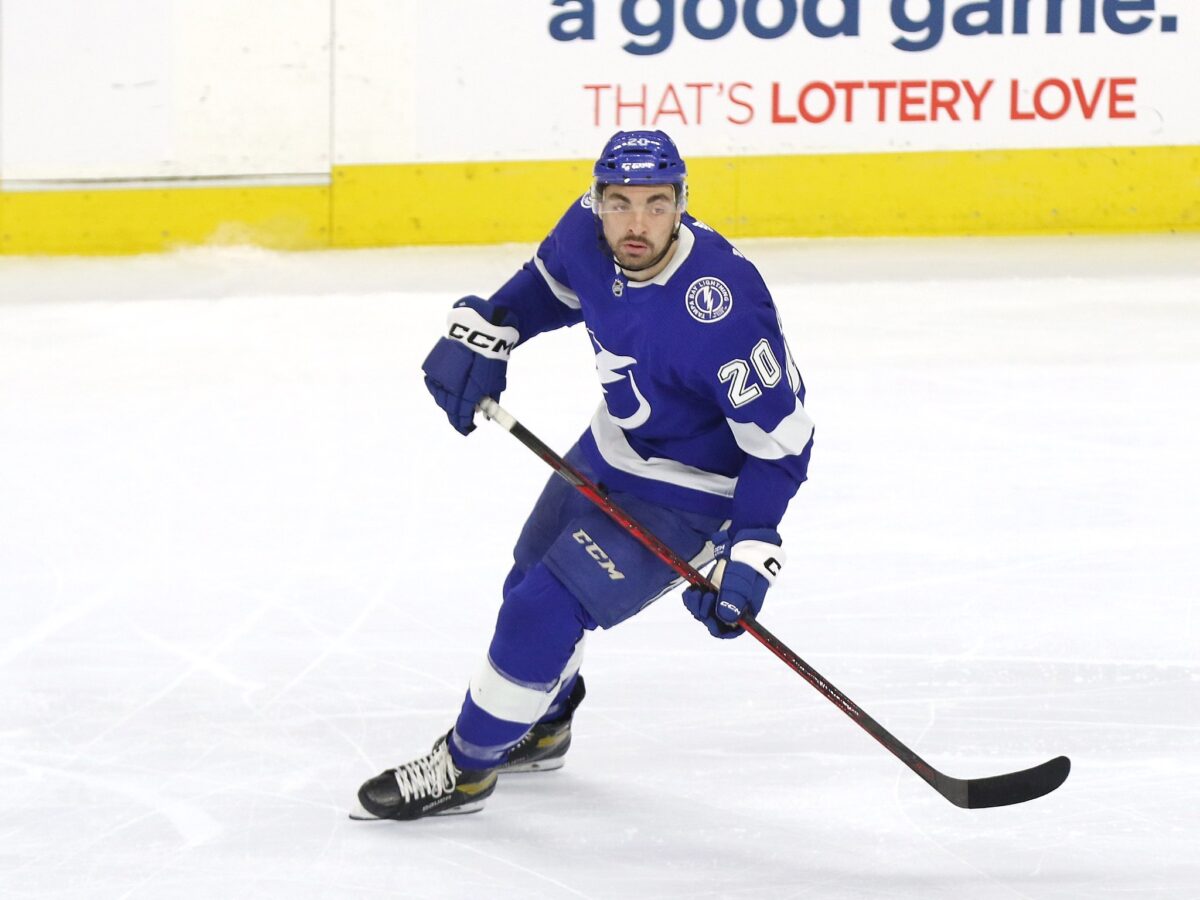
Obviously, the argument for a longer deal is a smaller AAV. And at $3.15 million, Paul is a valuable piece who scored 24 goals last season. But the 29-year-old is leaving his prime with five more seasons left to play. Some will argue that the newly re-acquired Ryan McDonagh contract beats out Paul’s for worst on the Lightning. But McDonagh is still a solid player and only has two seasons left on his deal. The risk on five more seasons of Paul seems to be the most potentially problematic. The Lightning are still a well run team with very few bad contracts, and Paul’s is nowhere near as problematic as others on this list — but it’s just a few seasons longer than it needs to be.
Toronto Maple Leafs: Chris Tanev
(Six years, $4.5 million, NMC)
It’s not going to be popular in the Greater Toronto Area, but there really is no justification for the six-year contract Toronto Maple Leafs general manager Brad Treliving gave to 34-year-old Chris Tanev this summer. Yes, he was still a solid defenseman this past season who helped the Stars reach the Western Conference Final as a deadline acquisition. He’s still a good player in the NHL. But there are clearly more good seasons behind him than in front of him. And a six-year extension for a player in his mid-30s is always going to raise eyebrows.
Some will argue that in Free Agency, you have to stretch your budget to get the player you need, but that’s a logical fallacy: if a player isn’t worth a contract, he simply isn’t worth the contract, whether he’s a free agent or not. Some will argue that the four-year, $14 million extension given to Oliver Ekman-Larsson is worse than Tanev’s. They are both bad deals, but Tanev’s is more expensive and longer. If Ekman-Larsson and Tanev end up being the backbone pieces that help the Maple Leafs secure their first Stanley Cup since 1967, I will be the first to eat crow. But right now, they look like desperate moves from a desperate team, and moves that make the Maple Leafs’ defense a lot more expensive without making it significantly better.
(One year, $3.5 million, M-NTC)
The Utah Hockey Club has had a newsworthy offseason, to say the least. And when new owner Ryan Smith bought the team to move it to Salt Lake City, he bought a franchise with very few bad contracts (in fact, one with very few long contracts at all). Alexander Kerfoot has one season left on his deal. He was not a very valuable player for the Arizona Coyotes last season, and at $3.5 million, he’s clearly overpaid. But if that’s the worst contract on the entire roster, it’s proof that Smith is inheriting a team in a very good position to build back up quickly.
Vancouver Canucks: Dakota Joshua
(Four years, $3.25 million, M-NTC)
On the day of this writing, news broke from Dakota Joshua that he underwent successful treatment for testicular cancer this summer and would be working his way back this season. We wish him all the best and hope for a speedy recovery!
From a purely on-ice perspective, Joshua’s brand-new four-year deal feels like a reach. Kudos to the Dearborn, Michigan native and Ohio State University alum: he worked his way from a Maple Leafs castoff to a key piece of the Canucks’ lineup in one of the best Vancouver seasons in recent memory. And he earned a healthy contract extension. But can his 18-goal performance be repeated? His 103.7 PDO and 21.4 shooting percentage (S%) seem to indicate that it’s unlikely. Joshua plays a good game and can move up and down the lineup, he’s certainly a valuable player. But the Canucks are paying him for output that is unlikely to be replicated, and that’s never a great start to a contract.
Vegas Golden Knights: Ivan Barbashev
(Four years, $5 million, M-NTC)
Speaking of paying too much for versatile middle-six forwards, Ivan Barbashev became a fan favorite in Vegas with a fantastic performance during the 2023 playoffs — which culminated in his capturing his second Stanley Cup. But for a team that has been ruthless in moving on from players, no matter how beloved, the five-year, $25 million contract extension the Golden Knights gave Barbashev the following offseason was certainly surprising. Barbashev is a useful player and had a fine 2023-24 season. But for a cap-strapped team like Vegas, every dollar counts. And, frankly, Vegas could find rentals that do what Barbashev does most seasons at the deadline. There aren’t many bad contracts in Vegas, but this is at least one to scratch your head about.
Washington Capitals: Tom Wilson
(Seven years, $8.5 million, NMC)
It’s a tale as old as time: never give a long and expensive extension to a power forward in his 30s. The Capitals did that with Tom Wilson in 2023, giving him a seven-year, $45.5 million extension that is officially kicking in this season. he is not going to be worth anywhere near that over the life of this contract. Luszczyszyn ranked his the third-worst contract entering the season, saying “While Wilson can still bully, his ability to score seriously tanked last season making it difficult to have confidence in his ability to still be a top-six scorer, let alone top line.” At $8.5 million per season, the Capitals are clearly paying Wilson like a top-liner. But if he’s already slipped behind that pace at age 30, what’s his deal going to look like in three, four, or five seasons, let alone seven?
Winnipeg Jets: Mark Scheifele
(Seven years, $8.5 million, NMC)
It’s easy to understand the seven-year extension the Winnipeg Jets gave Mark Scheifele last summer. After months, even years of speculation that they would lose one or both of their superstars Scheifele and goaltender Connor Hellebuyck, the Jets shocked the hockey world by signing both in one fell swoop, defeating in the process the accusation that the franchise couldn’t keep top talent. And Scheifele has been the Jets’ best forward for many years. He’s still a very good player. He’s just not going to be an $8.5 million for much longer if he even is one now.
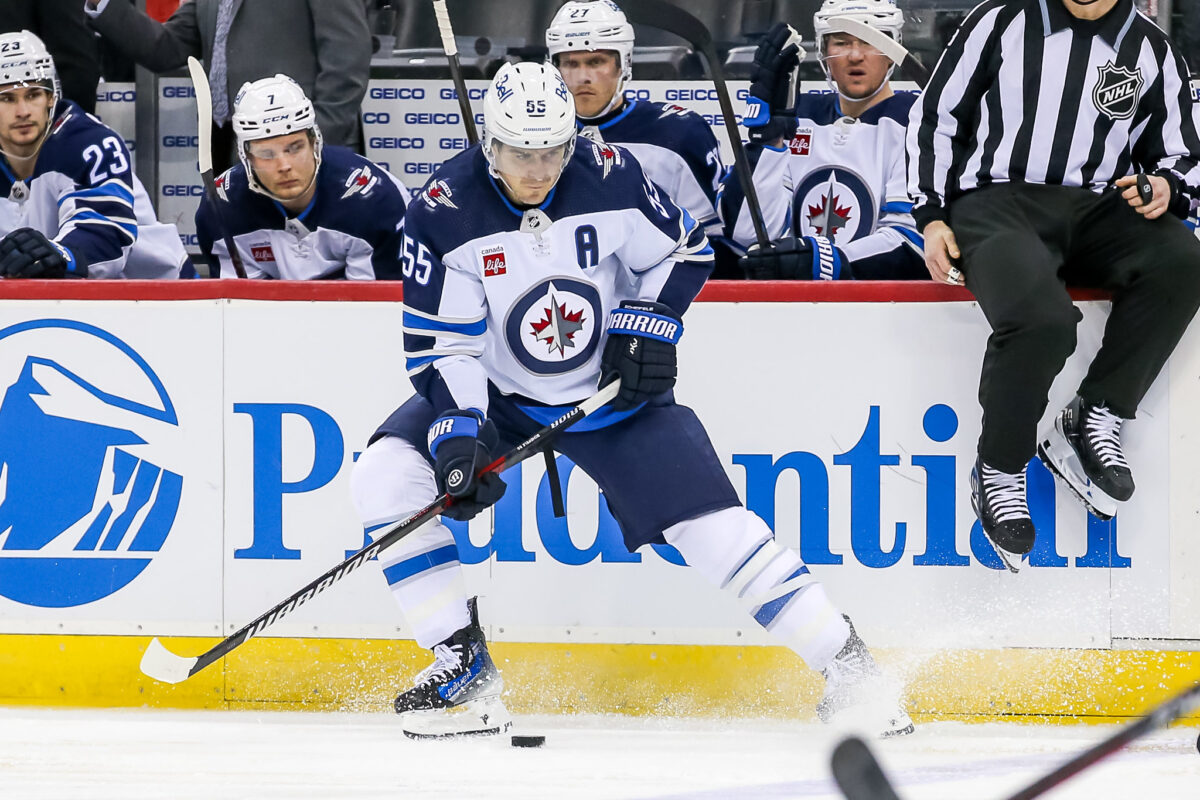
Scheifele is an elite offensive producer and creator. But as good as he is in the offensive zone, he is horrendous in his own end. Evolving-Hockey ranks him in the second percentile in that category, near the very bottom of the league. A true number-one center has to be an all-around performer, and Scheifele already isn’t that at age 31. He won’t likely improve in that respect over the seven seasons of this contract, and meanwhile, history indicates that his offense will start to drop off. If that happens, this contract will be very rough for the Jets in due course. But for now, it’s worth it for them to keep a very good core in tact.
Spending Never Stops
If there is one constant in the NHL, it’s general managers offering contracts that their fans (and often their successors) wish they hadn’t. Every team has done it and no roster is without its blemishes. Some are worse than others, but every team has a bad deal on the books. The important thing to remember is that a bad contract does not necessarily mean a bad player. But we’re curious: which contract would you like to see YOUR team get rid of? And how would you like them to deal with it? Let us know what you think!
